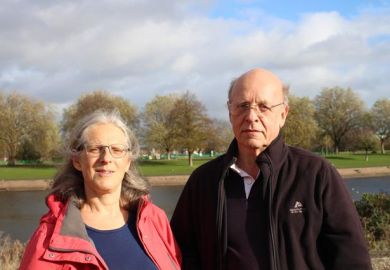Source: Getty
Crash course: students were critical of the university’s decision not to offer the module ‘Bubbles, Panics and Crashes’
A “flagship” economics programme at the University of Manchester has seen student satisfaction levels fall by more than a fifth, which campaigners claim is due to its failure to reflect alternative economic perspectives.
According to results and comments from the 2014 National Student Survey, shown to Times Higher Education by the University of Manchester Post-Crash Economics Society, overall satisfaction with economics at Manchester has slipped by 7 percentage points compared with last year. For the bachelor of economic science programme, described by the university as its “flagship degree programme in modern, quantitative economics”, levels are down 21 per cent. Economics courses at the institution now rate 12 percentage points lower than the Russell Group average.
The PCES is a student-led pressure group that campaigns for changes to economics education. It said the results demonstrated how disappointed students are with the university’s decision not to offer a module entitled “Bubbles, Panics and Crashes”, which the society felt would have incorporated the alternative economic perspectives that they wish to see included. In March, the PCES called on students to “hold fire on filling in their NSS” until the university had decided whether it would offer the module. It opted not to, and a lecturer who had taught the course as an optional out-of-hours module last year did not have his temporary contract renewed.
A number of comments submitted as part of the NSS, seen by THE, reflected this disappointment. “There have been no instances of alternative economic theories being presented other than neoclassical,” said one. “This means I feel unable to understand the way the economy and agents behave outside of mathematical models.”
“Thinking outside of the box is not encouraged,” wrote another, with a third saying: “The university has merely taught me how to take exams.”
One said they were “very disappointed in the way the university has dealt with requests from students to change the way economic science is taught at university”, while another added that they “do not appreciate…such a broad subject being taught in such a mind-numbing and narrow way”, adding: “To put it simply, I used to really enjoy economics before I came to university and now I do not.”
One student described the university’s decision not to offer the Bubbles module as “breathtaking arrogance and ignorance”, while another said it demonstrated “that it is not listening to my voice on the matter of teaching alternative schools of economic thought”.
A Manchester spokesman said the NSS results relating to the BEconSc were “a concern, and a puzzle” given that other programmes that shared many of its modules had improved on overall student satisfaction.
It was disappointing, he added, that the PCES had campaigned for students to use the NSS “strategically” – something that “may have adversely affected last year’s results”.
He said the university had responded by working with all its current students “to understand their real concerns so that we can improve the student experience”.
This has resulted in changes to assessment practices and the imminent introduction of changes governing class sizes and enhanced contact time with academic staff.
He added that the economics department had taken “a number of steps to enhance its curriculum”, including the introduction of new modules in economic policy and behavioural economics, and that the university was conducting a “wide-ranging curriculum review of our core economics programmes”.
Register to continue
Why register?
- Registration is free and only takes a moment
- Once registered, you can read 3 articles a month
- Sign up for our newsletter
Subscribe
Or subscribe for unlimited access to:
- Unlimited access to news, views, insights & reviews
- Digital editions
- Digital access to THE’s university and college rankings analysis
Already registered or a current subscriber?





